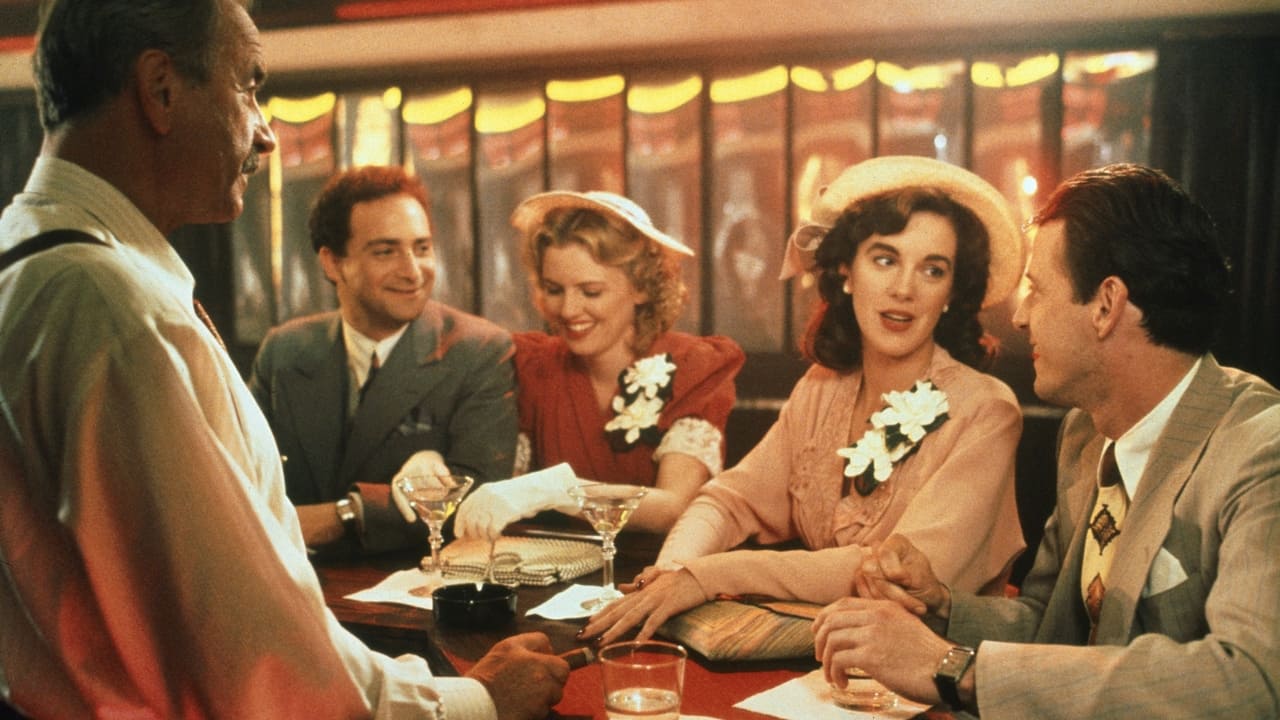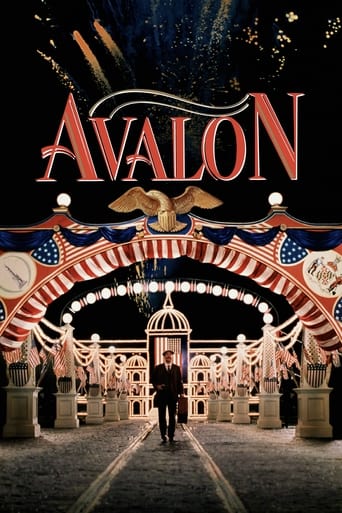



brilliant actors, brilliant editing
A Brilliant Conflict
n my opinion it was a great movie with some interesting elements, even though having some plot holes and the ending probably was just too messy and crammed together, but still fun to watch and not your casual movie that is similar to all other ones.
View MoreThe joyful confection is coated in a sparkly gloss, bright enough to gleam from the darkest, most cynical corners.
View MoreBarry Levinson has gathered a big ensemble cast of great actors including Aidan Quinn, Elizabeth Perkins, Armin Mueller-Stahl, Kevin Pollak, and Joan Plowright.It's a multi-generational story of an immigrant Polish Jewish family in Baltimore. It's Levinson's semi-autobiographical film. As such, it has some funny slice-of-life scenes like the whole family gathered up to see the first TV and the only thing on is the test screen. The family first finds success in selling TV. Eventually the extended family scatter to the winds.It has the grand scale and the feel of the era. It has some great bits of family stories. There are great actors, and Levinson is in charge. All the pieces are in place. This should be a masterpiece, but it's not quite there. The story just go on and on and on. There really isn't any flow that ramps up to a climax. It's just a series of interesting family vignettes coming one after the other. It goes on too long.This is essentially Levinson's home movie reshot onto the big screen. As such it is the best home movie in anybody's dusty attics. But like all those home movies, it probably means more for people who remember those times than those of us who were never there.
View MoreOn paper, writer-director Barry Levinson's semi-autobiographical Avalon, which begins with the arrival of Polish Jew Sam Krichinsky (Armin Mueller- Stahl) in the Avalon area of Baltimore, Md., on July 4, 1914, and ends when he is in his dotage on another July 4 sometime in the sixties, is an intellectually crystalline epic about the demise of the extended family, the erosion of traditional American and European values, the growth of alienated suburban culture (organized around television) and the hegemony of materialism.That's on paper. On screen, Avalon is unconscionably sloppy (the leaves of deciduous trees in Baltimore at Christmas are green on one block, yellow on another and non-existent on a third), structurally amorphous (the movie could end at any time or go on forever, which it seems to do), and gummily sentimental (grandparents and children are psychologically saintly). The lovely moments and fine performances in the picture can't redeem Levinson's technical carelessness - the editing is without rhythm, momentum, or even logic - nor can they compensate for Avalon's ethnographic toothlessness: imagine Mordecai Richler without the bite.Levinson would have made Duddy Kravitz a mensch.Avalon is more irritating than most ambitious failures because Levinson, winner of the best directing Oscar in 1988 for Rain Man, is wildly talented, and his two earlier semi-autobiographical films set in Baltimore, Diner and Tin Men, were twin peaks of Proustian purity. Structured lightly but soundly, in the esthetic version of aluminum, they vaulted over the twin valleys of bathos, sentimentality and nostalgia.Avalon is a bridge made of lead.But students of performance will want to see it for a quartet of reasons. The first is Armin Mueller-Stahl, the East German actor who came West in the late seventies and has not been within spitting distance of mediocrity since, whether as the tortured politician in Rainer Werner Fassbinder's Lola, the complex farmer in Angry Harvest or Jessica Lange's mysterious father in Music Box. As written, Avalon's Sam Krichinsky is fundamentally a grandchild's adoring projection of a grandfather, but Mueller-Stahl's Prussian blue eyes bespeak more depth than the character is permitted to articulate; when the script does become bluntly pedantic, Mueller-Stahl subtly softens the blows. Sadly, even this great actor is done in at the end when he is plastered with outrageously inept old-age makeup. He looks like nothing less than a blue-eyed, Teutonic E.T. about to sing a geriatric variation of Cabaret's Nazi hymn, Tomorrow Belongs to Me: Yesterday Vas Mine.The second extraordinary actor is Joan Plowright, the British widow of Laurence Olivier; she plays Eva Krichinsky, Sam's Polish-American wife, with a flawless accent, as if she had not done Shakespeare, Chekhov, John Osborne or Peter Greenaway, all of whom she has, of course, enlivened. But technique aside, she follows Mueller-Stahl in toughening up the soft edges and in softening the rough edges of a character verging on caricature; while certainly Jewish, her meddling mother-cum-grandmother is no stage- bound Jewish mother.The most fully dramatized conflict in Avalon involves the grandparents and their relationship to their son Jules and his wife Ann (and eventually to the young couple's children), all of whom live together. Aidan Quinn, as the cautious and contemplative Jules, and Elizabeth Perkins, as the fun-loving but responsible Ann, complete the foursome of exceptional performances: he infuses an introvert with exterior life and she captures the spirit of femininity in the fifties with eerie exactitude, as if Life had come to life (it's an asset that she looks like the Judy Garland of that period).Four fabulous musicians, less than fabulous music for them to play: the resonant sequences (an on-going Thanksgiving argument, for example) are regularly intercut with comic schtick, the most egregious instance being the purchase of a television set - would people interested enough in TV to buy one not know that during the day there were no programs? The purchasers sit in front of the box, watch the test pattern, get disgusted, and leave it to the kids. It's a funny bit, but it's fraudulent, and it corrodes Avalon, which is trying to do something new, with the stuff of deja-vu. There are two lines delivered by Eva that express the irritation Avalon engenders: "How many times do we have to hear this story? We all heard it before." Benjamin MIller, Filmbay Editor
View MoreWhat "Avalon" portrays seems like the sort of stories that we have often heard of immigrant families: the first generation comes to America and thinks that it's the greatest place, the second generation distances itself from its ancestry by changing the family name, and the third generation feels torn between these, and the question of what the fourth generation will do. Certainly the movie does a really good job showing not only that, but also the changing America of the post-war era (TV and the move to the suburbs). As for the schism, I guess that such things often happen in families. As a fourth-generation American born long after what the movie portrays, maybe I can't relate to it 100%, but it's still a movie that I recommend to everyone. Once again, Barry Levinson does a great job showing his native Baltimore.Starring Armin Mueller-Stahl, Joan Plowright, Aidan Quinn, Elizabeth Perkins, Kevin Pollak, Elijah Wood and Lou Jacobi.
View MoreTHIS REVIEW CONTAINS SPOILERS: I missed this film when it came out and eagerly taped it when it recently came on television. The trailers emphasized the nostalgic feel and I vaguely remembered it being a period piece about how modern life--especially television--splintered close family ties. What I didn't expect is the movie's journey to hyper-realism. When a film starts out like it's going to be in the same vein as, say, "A Christmas Story", I didn't expect it to end up like a documentary on the indignities of old age. Imagine every report on senility and its toll on everyone and you get an idea of the end. It isn't this movie's fault that the trailers portrayed it as one thing, and it was something else. It isn't the movie's fault that I just wasn't in the mood to see what's happening in real life in homes all over this country. If the movie does have a fault, it's that the director/writer, actors, and set designers, etc., were so good at setting the tone for a gentle trip down memory lane, it was just so jarring when realism intruded at the end. I think the same thing could have been accomplished by stopping at the "hypnotized by TV" holiday dinner--with a lot less scenes of heartbreaking decline. I know that wasn't what the filmmaker wanted to do, but it would have been a film I would have enjoyed seeing more. We should be depressed by what this story says about us; I just wasn't expecting a lesson on the topic when I taped this film. That's my fault, but so many people use the terms "feel-good" and "nostalgic" to describe this film, and I didn't feel good after watching and I consider nostalgia to be something that leaves you with a happy, positive feeling about the past. For all this film's fine acting and great set design, it did not leave me with anything but regrets--maybe that was the point.
View More